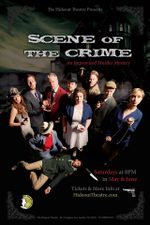Difference between revisions of "Scene of the Crime"
(added credits as per http://www.timeout.com/austin/things-to-do/scene-of-the-crime-1) |
(put in info from questionnaire at https://docs.google.com/document/d/13un8sWqBkOHJE22xy_RJE1KQH9hEN2zbguHTjVjPaAw/edit?usp=docs_home) |
||
| Line 11: | Line 11: | ||
}} | }} | ||
'''''Scene of the Crime''''' | '''''Scene of the Crime''''' was the May/June 2015 [[List_of_Hideout_Mainstage_Shows_in_Chronological_Order|mainstage production]] at [[The Hideout Theatre]]. It was based on the works of [[wikipedia:Agatha Christie|Agatha Christie]] and other authors from the [[wikipedia:Golden Age of Detective Fiction|Golden Age of detective fiction]]. | ||
== Summary == | == Summary == | ||
=== Structure === | |||
''Scene of the Crime'' was a narrative show that ran 80-90 minutes with a 10-minute intermission. Each performance had nine to ten players. The story centered on a detective and a victim, with the rest of the cast playing suspects. | |||
At the start of each performance, the cast took the stage in the dark. The lights came up, and Troy welcomed the audience and got three suggestions from the audience: first, one of four primary places (a hotel, a train, a ship, or a country estate), which were printed on four cards from which an audience member chose at random; second, a geographical location for the place (e.g., Istanbul); and third, how the victim is murdered (e.g., knife, poison, chainsaw). | |||
The first scene would depict the murder. To preserve the mystery, the 'victim' performer would play it out as a solo scene, with the murderer's presence implied. The story would proceed over the course of a few days of story time, alternating between interrogations, accusations, and revelations in the current day and flashbacks to suspects' interactions with the victims, all the while drawing out mystery and tension. The story ended with the detective gathering all the suspects together, describing the evidence gathered to that point, and showing how it revealed the identity of the murderer, who received their just comeuppance. | |||
=== Tech === | |||
The set featured a custom-built door upstage center. The show was scored live by [[James Blair]], who provided classically suspenseful keyboard music. There were also ambient sound effects -- birdsong, etc. -- depending on the location. Costumes were 'timeless' -- nice, classic, elegant outfits from anywhere from the 1940s to the present. Lighting was stylized for the flashback scenes, to make them distinct. | |||
=== Publicity Blurb === | === Publicity Blurb === | ||
From the show announcement:<blockquote>''Scene of the Crime'' takes its cue from [[wikipedia:Golden Age of Detective Fiction|classic whodunits]] crafted by the likes of [[wikipedia:Agatha Christie|Agatha Christie]], wherein a murder is committed at the outset of our story, and everyone is a suspect. | From the show announcement:<blockquote>''Scene of the Crime'' takes its cue from [[wikipedia:Golden Age of Detective Fiction|classic whodunits]] crafted by the likes of [[wikipedia:Agatha Christie|Agatha Christie]], wherein a murder is committed at the outset of our story, and everyone is a suspect. | ||
Revision as of 15:15, 11 December 2015
| Scene of the Crime | |
|---|---|
| Theater | The Hideout Theatre |
| Directed by | Troy Miller |
| Assistant Director(s) | Jenna Howard |
| Music By | James Blair |
| Cast | |
| Crew |
|
| Run | May/Jun 2015 |
Scene of the Crime was the May/June 2015 mainstage production at The Hideout Theatre. It was based on the works of Agatha Christie and other authors from the Golden Age of detective fiction.
Summary
Structure
Scene of the Crime was a narrative show that ran 80-90 minutes with a 10-minute intermission. Each performance had nine to ten players. The story centered on a detective and a victim, with the rest of the cast playing suspects.
At the start of each performance, the cast took the stage in the dark. The lights came up, and Troy welcomed the audience and got three suggestions from the audience: first, one of four primary places (a hotel, a train, a ship, or a country estate), which were printed on four cards from which an audience member chose at random; second, a geographical location for the place (e.g., Istanbul); and third, how the victim is murdered (e.g., knife, poison, chainsaw).
The first scene would depict the murder. To preserve the mystery, the 'victim' performer would play it out as a solo scene, with the murderer's presence implied. The story would proceed over the course of a few days of story time, alternating between interrogations, accusations, and revelations in the current day and flashbacks to suspects' interactions with the victims, all the while drawing out mystery and tension. The story ended with the detective gathering all the suspects together, describing the evidence gathered to that point, and showing how it revealed the identity of the murderer, who received their just comeuppance.
Tech
The set featured a custom-built door upstage center. The show was scored live by James Blair, who provided classically suspenseful keyboard music. There were also ambient sound effects -- birdsong, etc. -- depending on the location. Costumes were 'timeless' -- nice, classic, elegant outfits from anywhere from the 1940s to the present. Lighting was stylized for the flashback scenes, to make them distinct.
Publicity Blurb
From the show announcement:
Scene of the Crime takes its cue from classic whodunits crafted by the likes of Agatha Christie, wherein a murder is committed at the outset of our story, and everyone is a suspect.
Media
Videos
- Video of their 6/11/15 performance in The 46-Hour Improv Marathon.
Photos
- Photoset by Steve Rogers of the 5/2/15 debut.
- Photoset by Steve Rogers of the 6/13/15 performance.
- Photoset by Michael Yew that includes their 6/20/15 show in The 46-Hour Improv Marathon.
More Information
- The show announcement on the Hideout's facebook group.
